Archive for the ‘November 2011’ Category
3月 16, 2022
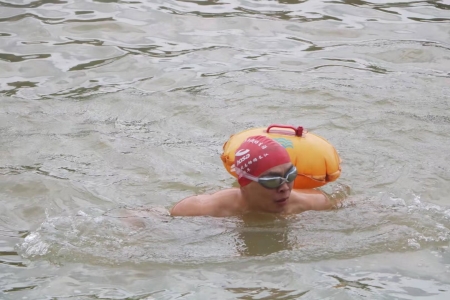
Huang Pingzi
SOMMER
Reis
senkt wie Mutter den Kopf
Mutter
beugt sich hinunter wie Reis
Mutter
schneidet den Reis mit der Sichel
Reis
schneidet mit Halmen Mutter ins Gesicht
Übersetzt von MW im März 2022
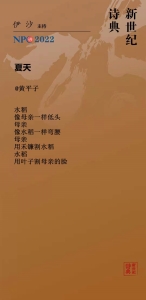
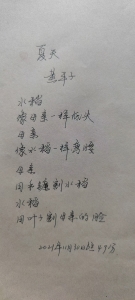 新世纪诗典11,NPC3月17日,4000首,1243人。第2个黄平子(江西)日
新世纪诗典11,NPC3月17日,4000首,1243人。第2个黄平子(江西)日
《新世纪诗典》大节点一4000首纪念日!
《新诗典》小档案:黄平子,男,70后,中学教师,在《新世纪诗典》、《磨铁读诗会》、《诗快报》等发表作品。磨铁读诗会2020年度汉语十佳诗人。傲夫诗社成员。写作是一种编码的过程,阅读是一种解码的过程。
伊沙推荐:《新世纪诗典》,第4000首推荐诗,留给一首极具经典性的作品。如果没有最后一句质感十足的蛰人句子,这只是一首很一般的诗,有了此句,一跃而居上品,这便是句的重要性,以及句与篇的关系。
伊沙:《新世纪诗典》4000天纪念日,萧衍有言:刻意为之,不算功德一一以此言自勉,走向未来。
况禹点评《新诗典》黄平子《夏天》:诗是一种非常奇特的文学体裁。奇就在于它不能以逻辑和因果来判定成败。有的诗,句句惊人,捏合到一起不成样子,甚至到结尾彻底掉了链子。有的诗,句句平易,临到结尾却来了句漂亮的翻转。本诗即是后者的一个代表。
黄平子读黄平子《夏天》
——《新世纪诗典》4000
夏天
黄平子
水稻
像母亲一样低头
母亲
像水稻一样弯腰
母亲
用禾镰割水稻
水稻
用叶子割母亲的脸
2021年11月30日6点49分
黄平子,男,70后,中学教师,在《新世纪诗典》、《磨铁读诗会》、《诗快报》等发表作品。磨铁读诗会2020年度汉语十佳诗人。写作是一种编码的过程,阅读是一种解码的过程。首先,要感谢磨铁,感谢沈浩波,里所,后乞。《夏天》先在磨铁读诗会选用。磨铁的肯定,增加了我投稿新世纪诗典的信心。其次,感谢伊沙,感谢他的选稿,感谢他在新世纪诗典4000首大关这个重要节点推荐《夏天》。第三,感谢《夏天》的评论者,翻译者,推荐者。《夏天》是写母亲的,也不仅仅写母亲。《夏天》是写童年记忆的,记忆里有苦痛,又不仅仅是苦痛。我喜欢夏天,喜欢夏天的热。在最热的夏天,我也不戴草帽,一任炎热的太阳晒出我的汗,晒脱我的皮。我一直很怕冷,夏天很好,不用愁没有衣服穿,大不了打赤膊。夏天是农村的收获季节。水稻在夏天成熟,花生在夏天成熟,西瓜在夏天成熟……虽然夏天忙得人直不起腰来,但是忙过了就有吃,有什么不好呢?我的老家太窝要山没山,要水没水。我们一家人就靠几亩薄地糊口。我父亲结扎后身体不好,家里的活大多由母亲做。在农村,割稻子是最辛苦的事。头顶有烈日,脚下有泥水。水稻的长叶子上长着锯齿,像一把把小锯子。一发稻子割下来,脸上、手上,到处都是血口子。稻子上还有细细的绒毛,沾到身上,有说不出的痒。天太热,湿答答的衣服又捂出了一身痱子……这让人又爱又恨的夏天啊!2022年3月16日20点43分
我的新长征之路
黄平子
从《小萝卜头》
到《夏天》
从1.0
到2.0
从3450
到4000
我整整走了
550天
此时
中央红军
已经胜利到达
陕西吴起镇
完全了
举世闻名的
二万五千里长征
2022年3月16日21点31分
标签:bending, body, cut, 黄平子, face, food, Huang Pingzi, leaves, mother, NPC, plant, poetry, rice, work, 新世纪詩典
发表在 1970s, 1980s, 1990s, 2000s, 2010s, 2011, 2012, 2013, 2014, 2015, 2016, 2017, 2018, 2019, 2020, 2020s, 2021, 2022, 20th century, 21st century, April 2011, April 2012, April 2013, April 2014, April 2015, April 2016, April 2017, April 2018, April 2019, April 2020, April 2021, August 2011, August 2012, August 2013, August 2014, August 2015, August 2016, AUGUST 2017, August 2018, August 2019, August 2020, August 2021, March 2022, Middle Ages, November 2011, November 2012, November 2013, November 2014, November 2015, November 2016, November 2017, November 2018, November 2019, NOVEMBER 2020, November 2021, NPC, poetry, Translations, 新世纪诗典 | Leave a Comment »
4月 3, 2021

10 YEARS – NPC十岁了!
10 years ago, Yi Sha 伊沙 began to present one poem each day on Chinese social media. This has become a representative collection of new poetry in the new century, aptly named NPC, New Poetry Canon 新世纪诗典.
Eight years ago I began to look for NPC poems each day, translating more and more into German and English. In 2014 my own poetry appeared on NPC for the first time. After two books of Yi Sha’s poetry, I have now published, along with Juliane Adler, the first book of a 4-volume-series of NPC poetry in Chinese and German. Here are the contents:


BRETT VOLLER NÄGEL 布满钉子的木板
NPC-Anthologie 新世纪诗典
Band 1: A–J. Gedichte
Chinesisch/Deutsch
Übersetzt von Martin Winter
Herausgegeben von Juliane Adler und Martin Winter
ISBN 978-3-903267-00-8
Lieferbar
€ 24.00
Bestellen
ORDER HERE













标签:3A, A Ti, A Wen, A Wu, A Yu, AAA, Ai Hao, Ai Mi, An Qi, anthologies, anthology, Ao Yuntao, Bai Diu, Bai Li, Bei Dao, Bei Lang, Benben S.K., book, Cai Xiyin, Caiwong Namjack, Caomu Xin, Cha Wenjin, Chang Yuchun, Chao Hui, Che Qianzi, Chen Moshi, Chen Yanqiang, Chen Yulun, Chen Yunfeng, Cheng Bei, Cheng Tao, Chun Sue, Cong Rong, 独禽, 白立, 秦非, 程涛, 笨笨 s.k., 第广龙, 簡天平, 纪彦峰, Da Duo, Da You, Dai Guanglei, Dechen Pakme, Denis Mair, Di Guanglong, Dong Yue, Du Qin, Du Sishang, Du Zhongmin, Duo Er, Eryue Lan, Ezher, 耿占坤, 胡赞辉, 胡泊, 金山, 艾米, 艾蒿, 艾孜哈尔, 草木心, 蒋彩云, 蔡喜印, 蔣雪峰, 蔣濤, 阿煜, 阿吾, 阿嚏, 阿文, 陈玉伦, 陈衍强, 陈默实, 陈云峰, 虎子, 韩敬源, 韩永恒, 韩东, 高歌, 鬼石, 谷驹休, 鴻鴻, 鸿鸿, 黄礼孩, 黄翔, 黄开兵, 黄海, 黄海兮, 车前子, 龚志坚, Fa Xing, Fei Qin, Feng Xuan, Gang Jumu, Gao Ge, Geng Zhankun, German, Gong Zhijian, Guangtou, Gui Shi, Hai An, Hai Jing, Hai Qing, Han Dong, Han Jingyuan, Han Yongheng, Hong Junzhi, Hou Ma, Houhou Jing, Hu Bo, Hu Zi, Huang Hai, Huang Kaibing, Huang Lihai, Huang Xiang, Hung Hung, Huzi, Ji Yanfeng, Jian Tianping, Jiang Caiyun, Jiang Erman, Jiang Rui, Jiang Tao, Jiang Xinhe, Jiang Xuefeng, Jianghu Hai, Jin Shan, Jun Er, language, languages, literature, media, people, poetry, poets, social media, time, translation, yi sha, 光头, 公子琴, 冈居木, 冯谖, 北岛, 北浪, 发星, 君儿, 大友, 大朵, 姜馨贺, 姜二嫚, 安琪, 常遇春, 德乾恒美, 成倍, 才旺南杰, 摆丢, 敖云涛, 春树, 朝晖, 朵儿, 杜思尚, 杜中民, 查文瑾, 梅丹理, 江睿, 江湖海, 洪君植, 海菁, 海青, 海岸, 三个A, 东岳, 二月蓝, 从容, 代光磊, 侯马
发表在 2000s, 2001, 2002, 2003, 2004, 2005, 2006, 2007, 2008, 2009, 2010, 2010s, 2011, 2012, 2013, 2014, 2015, 2016, 2017, 2018, 2019, 2020, 2021, 20th century, 21st century, April 2011, April 2012, April 2013, April 2014, April 2015, April 2016, April 2017, April 2018, April 2019, April 2020, April 2021, August 2011, August 2012, August 2013, August 2014, August 2015, August 2016, AUGUST 2017, August 2018, August 2019, August 2020, December 2011, December 2012, December 2013, December 2014, December 2015, December 2016, December 2017, December 2018, December 2019, December 2020, Februar 2017, February 2012, February 2013, February 2014, February 2015, February 2016, February 2018, February 2019, February 2020, February 2021, January 2012, January 2013, January 2014, January 2015, January 2016, January 2017, January 2018, January 2019, January 2020, January 2021, July 2011, July 2012, July 2014, July 2015, July 2016, JULY 2017, July 2018, July 2019, July 2020, June 2011, June 2012, June 2013, June 2014, June 2015, June 2016, June 2017, June 2018, June 2019, June 2020, Literadio, March 2011, March 2012, March 2013, March 2014, March 2015, March 2016, March 2017, March 2018, March 2019, March 2020, March 2021, May 2011, May 2012, May 2013, May 2014, MAY 2015, May 2016, May 2017, May 2018, May 2019, May 2020, Middle Ages, November 2011, November 2012, November 2013, November 2014, November 2015, November 2016, November 2017, November 2018, November 2019, NOVEMBER 2020, NPC, October 2011, October 2012, October 2013, October 2014, October 2015, October 2016, October 2017, October 2018, October 2019, OCTOBER 2020, poetry, September 2011, September 2012, September 2013, September 2014, September 2015, September 2016, September 2017, September 2018, September 2019, September 2020, Translations, Yi Sha, 嚴力, 安琪, 新世纪诗典, 江湖海, 伊沙, 侯馬 | Leave a Comment »
4月 3, 2021

Yi Sha
WINTER
On my way to the vegetable supermarket
in our compound
I see a small girl
on a big rock at the artificial lake
right above the ice going to
jump!
I am shouting:
„Don’t jump! Danger!“
But in this time
she has jumped already,
lightly,
safely
landing on the thick surface.
She turns around to me,
makes a ballet move
and becomes a small white swan.
Translated by MW, 4/3/2021
Yi Sha
WINTER
Ich geh zum Gemüsesupermarkt
in der Wohnhausanlage,
seh auf dem Weg ein kleines Mädchen
auf einem Felsen am künstlichen See,
sie will auf das Eis hinunter
springen!
Ich schrei:
„Achtung! Nicht springen!“
aber in der Zeit
ist sie schon gesprungen,
ganz leicht
und sicher
auf dem festen Eis gelandet.
Sie dreht sich zu mir um
in einer Bewegung aus dem Ballett
und wird ein kleiner weißer Schwan.
Übersetzt von MW am 3. April 2021


Yi Sha, orig. name Wu Wenjian. Well-known poet, writer, critic, translator, editor. Born in 1966 in Chengdu, lives in Xi’an. Graduated from Beijing Normal University in 1989. Has written over 20,000 poems, published, translated and edited 122 books. Received the Henry Luce prize for contemporary Chinese poetry and many other awards. Invited to poetry festivals in China, Sweden, England, Netherlands, South Korea etc., incl. the 2nd, 3rd, 4th & 5th Qinghai Lake international poetry festival, the 50th Struga poetry festival in Macedonia and many more. Vermont Studio Center fellow 2014. He has recited at the University of Vienna, at Arizona University etc. 《新诗典》小档案:伊沙,原名吴文健,男,当代著名诗人、作家、批评家、翻译家、编选家。 1966年生于四川成都。1989年毕业于北京师范大学中文系。写诗逾两万首,出版著、译、编122部作品。获美国亨利•鲁斯基金会中文诗歌奖金、韩国“亚洲诗人奖”以及中国国内数十项诗歌奖项。应邀出席瑞典第16届奈舍国际诗歌节、荷兰第38届鹿特丹国际诗歌节、英国第20届奥尔德堡国际诗歌节、马其顿第50届斯特鲁加国际诗歌节、中国第二、三、四、五届青海湖国际诗歌节、第二届澳门文学节、美国佛蒙特创作中心驻站作家、奥地利梅朵艺术中心驻站作家、美国亚利桑那大学为其举办的朗诵会、奥地利两校一刊为其举办的朗诵会与研讨会、2021年世界诗歌日线上国际诗歌节等国际交流活动。
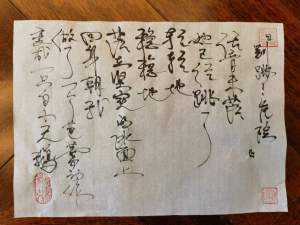
标签:animals, art, artificial, child, children, compound, daily life, danger, girl, ice, jump, lake, life, move, movement, NPC, people, poetry, reality, rock, rocks, season, supermarket, supermarkets, winter, yi sha, 新世纪詩典, 伊沙
发表在 1966, 1970s, 1980s, 1986, 1989, 1990s, 2000, 2000s, 2010s, 2011, 2012, 2013, 2014, 2015, 2016, 2017, 2018, 2019, 2020, 2021, 20th century, 21st century, April 2011, April 2012, April 2013, April 2014, April 2015, April 2016, April 2017, April 2018, April 2019, April 2020, April 2021, August 2011, August 2012, August 2013, August 2014, August 2015, August 2016, AUGUST 2017, August 2018, August 2019, August 2020, December 2011, December 2012, December 2013, December 2014, December 2015, December 2016, December 2017, December 2018, December 2019, December 2020, Februar 2017, February 2011, February 2012, February 2013, February 2014, February 2015, February 2016, February 2018, February 2019, February 2020, February 2021, January 2011, January 2012, January 2013, January 2014, January 2015, January 2016, January 2017, January 2018, January 2019, January 2020, January 2021, July 2011, July 2012, July 2014, July 2015, July 2016, JULY 2017, July 2018, July 2019, July 2020, June 2011, June 2012, June 2013, June 2014, June 2015, June 2016, June 2017, June 2018, June 2019, June 2020, March 2008, March 2009, March 2010, March 2011, March 2012, March 2013, March 2014, March 2015, March 2016, March 2017, March 2018, March 2019, March 2020, March 2021, May 2011, May 2012, May 2013, May 2014, MAY 2015, May 2016, May 2017, May 2018, May 2019, May 2020, Middle Ages, November 2011, November 2012, November 2013, November 2014, November 2015, November 2016, November 2017, November 2018, November 2019, NOVEMBER 2020, NPC, October 2011, October 2012, October 2013, October 2014, October 2015, October 2016, October 2017, October 2018, October 2019, OCTOBER 2020, poetry, September 2011, September 2012, September 2013, September 2014, September 2015, September 2016, September 2017, September 2018, September 2019, September 2020, Translations, Uncategorized, Yi Sha, 新世纪诗典, 伊沙 | Leave a Comment »
3月 25, 2021

BRETT VOLLER NÄGEL 布满钉子的木板
NPC-Anthologie 新世纪诗典
Band 1: A–J
NPC stands for New Poetry Canon, or New Century Poetry Canon 新世纪诗典, presented by Yi Sha 伊沙 in Chinese social media each day since spring 2011. NPC outside of poetry is National People’s Congress, China’s parliament that convenes in the Great Hall of the People in Beijing for two weeks each March. Yi Sha’s NPC poem of the day on Sina Weibo 新浪微博, Tencent WeChat 微信 and other platforms gets clicked, forwarded, commented 10,000 times or more, each day. Each year a book comes out, about every week there are events in Xi’an, Beijing and many, many places all over China and beyond. All produced independently from among the people 民间, not by any state organizations. This book contains poems by 81 poets listed below. This is the first volume (A-J) in a series of four books. Compiled and edited by Juliane Adler and Martin Winter, translated by Martin Winter.
ORDER HERE
Bestellen
NPC steht für New Poetry Canon, eigentlich New Century Poetry Canon, 新世纪诗典. Abgekürzt als NPC. NPC steht sonst für National People’s Congress, also der Nationale Volkskongress, Chinas Parlament, das allerdings nur einmal im Jahr im März zwei Wochen lang zusammentritt. Seit 2011 wird von Yi Sha 伊沙 im NPC-新世纪诗典 jeden Tag ein Gedicht vorgestellt, in mehreren chinesischen sozialen Medien zugleich. Oft wird ein einziges Gedicht schon in den ersten zwei Tagen zehntausende Male angeklickt, kommentiert und weitergeleitet. Ein nationaler Poesiekongress und eine umfangreiche Studie der heutigen Gesellschaft. Band 1 präsentiert 81 Autorinnen und Autoren. Wird fortgesetzt.
Cover/Umschlag etc: Neue Arche von Kuang Biao 邝飚 und 3 Grafiken von: An Qi 安琪
Autorinnen und Autoren:
A Ti 阿嚏, A Wen 阿文, A Wu 阿吾, A Yu 阿煜, AAA (3A) 三个A, Ai Hao 艾蒿, Ai Mi 艾米, An Qi 安琪, Ao Yuntao 敖运涛, Bai Diu 摆丢, Bai Li 白立, Bei Dao 北岛, Bei Lang 北浪, Benben S. K. 笨笨. S. K, Cai Xiyin 蔡喜印, Caiwong Namjack 才旺南杰, Caomu Xin 草木心, Cha Wenjin 查文瑾, Chang Yuchun 常遇春, Chao Hui 朝晖, Che Qianzi 车前子, Chen Moshi 陈默实, Chen Yanqiang 陈衍强, Chen Yulun 陈玉伦, Chen Yunfeng 陈云峰, Cheng Bei 成倍, Cheng Tao 程涛, Chun Sue 春树, Cong Rong 从容, Da Duo 大朵, Da You 大友, Dai Guanglei 代光磊, Dechen Pakme 德乾恒美, Denis Mair 梅丹理, Di Guanglong 第广龙, Dong Yue 东岳, Du Qin 独禽, Du Sishang 杜思尚, Du Zhongmin 杜中民, Duo Er 朵儿, Eryue Lan 二月蓝, Ezher 艾孜哈尔, Fa Xing 发星, Fei Qin 秦菲, Feng Xuan 冯谖, Gang Jumu 冈居木, Gao Ge 高歌, Geng Zhankun 耿占坤, Gong Zhijian 龚志坚, Gongzi Qin 公子琹, Gu Juxiu 谷驹休, Guangtou 光头, Gui Shi 鬼石, Hai An 海岸, Hai Jing 海菁, Hai Qing 海青, Han Dong 韩东, Han Jingyuan 韩敬源, Han Yongheng 韩永恒, Hong Junzhi 洪君植, Hou Ma 侯马,Houhou Jing 后后井, Hu Bo 胡泊, Hu Zanhui 胡赞辉, Huang Hai 黄海, Huang Kaibing 黄开兵, Huang Lihai 黃禮孩, Huang Xiang 黄翔, Hung Hung 鴻鴻, Huzi 虎子, Ji Yanfeng 纪彦峰, Jian Tianping 簡天平, Jiang Caiyun 蒋彩云, Jiang Erman 姜二嫚, Jiang Rui 江睿, Jiang Tao 蔣濤, Jiang Xinhe 姜馨贺, Jiang Xuefeng 蔣雪峰, Jianghu Hai 江湖海, Jin Shan 金山, Jun Er 君儿

BRETT VOLLER NÄGEL 布满钉子的木板 NPC-Anthologie 新世纪诗典 Band 1: A–J
Die chinesischen Gedichte sind hauptsächlich erschienen in:
NPC 新世纪诗典 1-6,伊沙 编选 著,磨铁图书 (Xiron), Zhejiang People‘s Publishing 浙江人民出版社, Bände 1-6, herausgegeben von Yi Sha. Hangzhou 2012-2018
NPC 新世纪诗典 7,伊沙 编选 著,磨铁图书 (Xiron), China Youth Publishing 中国青年出版社, Band 7, herausgegeben von Yi Sha. Beijing 2018
NPC 新世纪诗典 8,伊沙 编选 著,磨铁图书 (Xiron), China Friendship Publishing 中国友谊出版公司, Band 8, herausgegeben von Yi Sha. Beijing 2020
Die restlichen Texte stammen aus Internetquellen (Soziale Medien: Sina Weibo, Tencent Weixin etc.) mit freundlicher Genehmigung der Autorinnen und Autoren. Die Texte aus 2019 und 2020-2021 werden in den Büchern NPC 9 und 10 erscheinen.

BRETT VOLLER NÄGEL 布满钉子的木板 NPC-Anthologie 新世纪诗典 Band 1: A–J
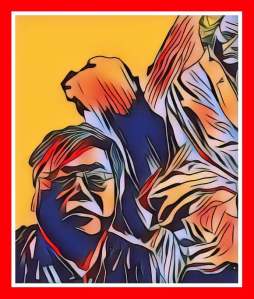



标签:3A, A Ti, A Wen, A Wu, A Yu, AAA, Ai Hao, Ai Mi, all, An Qi, animals, Ao Yuntao, Bai Diu, Bai Li, Bei Dao, Bei Lang, Benben S.K., board, bodies, body, book, books, Cai Xiyin, Caiwong Namjack, Caomu Xin, Cha Wenjin, Chang Yuchun, Chao Hui, characters, Che Qianzi, Chen Moshi, Chen Yanqiang, Chen Yulun, Chen Yunfeng, Cheng Bei, Cheng Tao, children, Chun Sue, Cong Rong, contact, continent, cracks, culture, customs, 独禽, 白立, 秦菲, 程涛, 笨笨 s.k., 第广龙, 簡天平, 纪彦峰, Da Duo, Da You, Dai Guanglei, day, Dechen Pakme, Denis Mair, Di Guanglong, discussions, Dong Yue, Du Qin, Du Sishang, Du Zhongmin, Duo Er, Eryue Lan, everything, expression, eyes, Ezher, 耿占坤, 胡赞辉, 胡泊, 金山, 艾米, 艾蒿, 艾孜哈尔, 草木心, 蒋彩云, 蔡喜印, 蔣雪峰, 蔣彩雲, 蔣濤, 阿煜, 阿吾, 阿嚏, 阿文, 陈玉伦, 陈衍强, 陈默实, 陈云峰, 虎子, 高歌, 鴻鴻, 黃禮孩, 黄翔, 黄开兵, 黄海, 黄海兮, 车前子, 龚志坚, Fa Xing, fabrik.transit, face, faces, Fei Qin, Feng Xuan, figures, food, Gang Jumu, Gao Ge, Geng Zhankun, Gong Zhijian, hearts, history, Hong Junzhi, Hou Ma, Houhou Jing, Hu Bo, Hu Zanhui, Huang Hai, Huang Haixi, Huang Kaibing, Huang Lihai, Huang Xiang, Hung Hung, Huzi, island, islands, Ji Yanfeng, Jian Tianping, Jiang Caiyun, Jiang Erman, Jiang Rui, Jiang Tao, Jiang Xinhe, Jiang Xuefeng, Jianghu Hai, Jin Shan, Juliane Adler, Jun Er, language, languages, life, literature, Martin Winter, mask, masks, Mediterranean, memory, men, minds, mountains, mouth, nail, names, night, NPC, pages, paper, people, performance, plain language, poetry, politics, province, religion, ritual, rivers, society, spirit, taiwan, Taiwanese, territory, Tibetan, tongue, translation, Uighurs, voice, volume, women, wood, words, writing, year, yi sha, youth, 冈居木, 冯谖, 北岛, 北浪, 发星, 后后井, 君儿, 大友, 大朵, 姜馨贺, 姜二嫚, 安琪, 常遇春, 德乾恒美, 成倍, 才旺南杰, 摆丢, 敖运涛, 新世纪詩典, 春树, 朝晖, 朵儿, 杜思尚, 杜中民, 查文瑾, 梅丹理, 江睿, 江湖海, 洪君植, 三个A, 东岳, 二月蓝, 从容, 代光磊, 伊沙, 侯马
发表在 1940s, 1950s, 1960s, 1970s, 1980s, 1990s, 2000, 2000s, 2001, 2002, 2003, 2004, 2005, 2006, 2007, 2008, 2009, 2010, 2010s, 2011, 2012, 2013, 2014, 2015, 2016, 2017, 2018, 2019, 2020, 2021, 20th century, 21st century, Antique times, April 2011, April 2012, April 2013, April 2014, April 2015, April 2016, April 2017, April 2018, April 2019, April 2020, August 2011, August 2012, August 2013, August 2014, August 2015, August 2016, AUGUST 2017, August 2018, August 2019, August 2020, December 2011, December 2012, December 2013, December 2014, December 2015, December 2016, December 2017, December 2018, December 2019, December 2020, Februar 2017, February 2012, February 2013, February 2014, February 2015, February 2016, February 2018, February 2019, February 2020, February 2021, January 2012, January 2013, January 2014, January 2015, January 2016, January 2017, January 2018, January 2019, January 2020, January 2021, July 2011, July 2012, July 2014, July 2015, July 2016, JULY 2017, July 2018, July 2019, July 2020, June, June 2011, June 2012, June 2013, June 2014, June 2015, June 2016, June 2017, June 2018, June 2019, June 2020, Literadio, March 2011, March 2012, March 2013, March 2014, March 2015, March 2016, March 2017, March 2018, March 2019, March 2020, March 2021, May 2011, May 2012, May 2013, May 2014, MAY 2015, May 2016, May 2017, May 2018, May 2019, May 2020, Middle Ages, November 2011, November 2012, November 2013, November 2014, November 2015, November 2016, November 2017, November 2018, November 2019, NOVEMBER 2020, NPC, October 2011, October 2012, October 2013, October 2014, October 2015, October 2016, October 2017, October 2018, October 2019, OCTOBER 2020, poetry, PR, September 2011, September 2012, September 2013, September 2014, September 2015, September 2016, September 2017, September 2018, September 2019, September 2020, Translations, Uncategorized, 安琪, 新世纪诗典, 江湖海, 三个A, 伊沙, 侯馬 | Leave a Comment »
11月 7, 2011

if
if we could kiss & love all day
maybe we wouldn’t go astray;
maybe we wouldn’t break our vows,
maybe we wouldn’t break our necks,
maybe we would not break our words,
maybe we would not break our heads.
it’s worth a try for you and I
a day in love,
a day regained,
a day at work,
a day with child.
with sun and wind both rather mild.
a normal day. it’s not so bad.
we cope. we function. we’re not mad
at anyone if we can help
ourselves to coffee, smoking, beer
or maybe lips. or maybe arms.
if we could piss and fart all night
maybe our troubles would be light
compared to other people’s fear.
we seldom write our nightmares down.
the pencil is not right at hand.
if we can tell it we are good.
if someone listens we are fine.
if we could telephone all day
if we could dance or read all night
maybe we wouldn’t go astray
maybe we couldn’t go and fight
each other in a different way.
each day is full of work and fright
and light and kisses
in our heads
till we are dead.
i love you.
see you soon, take care.
MW Nov. 2011
New painting by Yang Jinsong. Would love to see it up close. No melons, cats or fish, very simple drawing style, concentrated. The two figures are just arriving.
标签:art, life, love
发表在 November 2011 | Leave a Comment »
11月 7, 2011

ansprache
die sprache ertappen
die sprach zu ersuchen
die sprache erflehen
die sprach anzurufen
die sprache erbitten
die sprach zu erfahren
die sprache erwaegen
die sprach aufzubahren
die sprach anzutreffen
die sprach zu erlernen
die sprache der titten
die sprach in den sternen
die sprache des mondes
die rede des himmels
den atem der wolken
die luft in den baeumen
das licht in den zweigen
das gras auf den feldern
die sprache erfinden
die sprache erhoeren
den abend erwarten
mit kraehen und staren
mit waeldern und graeben
und wasser in wegen
mit blaettern und kaefern
mit schwingen und beinen
noch einen dann reicht es
fuer heut gute nacht
MW November 2011
 Please sign the petition for Chen Guangcheng at http://chn.ge/nb4olQ 自由光诚!: 网友Sarcastic-O寄来一封支持墨镜肖像项目的呼吁信 http://freecgc.blogspot.com/2011/10/sarcastic-o.html
Please sign the petition for Chen Guangcheng at http://chn.ge/nb4olQ 自由光诚!: 网友Sarcastic-O寄来一封支持墨镜肖像项目的呼吁信 http://freecgc.blogspot.com/2011/10/sarcastic-o.html
标签:fall, language, life
发表在 November 2011 | 2 Comments »
11月 6, 2011
去捷克三天,在布拉格犹太庙里印象很深的有小孩在集中营做的画和其他艺术品,还有诗歌。

Čtrnáctiletý Hanuš Hachenburg a s ním i ostatní nově hledají své místo na světě, které jim bylo
ukradeno.
„Co jsem?
Ke kterému patřím z národů?
Já děcko bloudící?
Je mojí vlastí hradba ghett,
či země zrající,
spějící, malá, spanilá,
jsou Čechy vlastí, svět?“ [8]
 Odpovědí na Hanušovy otázky mohou být verše Františka Basse. Tento chlapec vyjadřuje hrdost na svůj
Odpovědí na Hanušovy otázky mohou být verše Františka Basse. Tento chlapec vyjadřuje hrdost na svůj
původ a neochotu poddat se. Promlouvá ke všem Židům, podněcuje je k tomu, aby se nestyděli za to
kým jsou a aby po zemi vždy kráčeli se vzpřímenou hlavou.
“Jsem žid
Jsem žid a židem zůstanu
i když já hlady umírati budu
tak nepodám se národu
Bojovat já vždy budu
za můj národ na mou čest
Nikdy se stydět nebudu
za můj národ na mou čest.
Pyšný já jsem na svůj národ
jakou má ten národ čest
Vždy já budu utlačený
Vždy já budu zase žít.“[9]
 Upstairs in the Pinkas Synagogue at the Old Jewish Cemetery of Prague, they have a collection of children’s art works from Theresienstadt (Terezin), where the Jews from Bohemia, Moravia and other regions were imprisoned before further deportation. Very few children, about 100 of 50.000, survived. I don’t remember the exact numbers, please check the links in the pictures, there is a lot of information, and there are pictures of the synagogues in Prague, some of the children’s art works, and so on. At the other end of the Old Jewish cemetery, at the Klausen Synagogue, in a glass case somewhere among the explanations about Jewish holidays, customs and traditions, was a little poem that begins with “Jsem žid“, “I am Jewish”. It was written by František Bass, or Franz Bass, don’t know how they called him at home. Franz Bass sounds very much like Franz Kafka. Many Jews spoke German, or Jiddish, others spoke Czech, many spoke and wrote all three and more. František Bass was 11 years old. The poem is not very long, and rather conventional, as a patriotic poem. It is very forceful, very powerful, in the circumstances. So I wrote it down, in Czech, tried to copy all those letters and symbols exactly. There was an English translation next to the original poem. But although I don’t speak Czech, I could tell that the original was a real poem, there is economy in the words, there are very few words compared to the clumsy translation. I wrote it down, and a few days later I got around to Google the poem. So I found this paper online, a thesis or a dissertation at a Czech university, just a text file. The little poem by Franz Bass is quoted in full, and it is put in context with another poem by the 14-year-old Hanuš Hachenburg. Hanush Hachenburg asks, asks himself and the listener what he his, which country or nation he could belong to. He should be Czech, at least he writes in Czech. But no, Hachenburg is answered by Frantishek Bass, he can only say for certain that he’s Jewish. And you can be proud of being Jewish, says Frantishek Bass. That’s what his poem is about, so I’ve called it patriotic. I think it’s very powerful. Jsem žid a židem zůstanu, i když já hlady umírati budu, tak nepodám se národu. I am Jewish, I will stay Jewish, even if I die of hunger, I won’t give up my nation. Or I won’t give in to any other nation, it doesn’t really matter, you’ll see. Bojovat já vždy budu, za můj národ na mou čest, Nikdy se stydět nebudu, za můj národ na mou čest. I’ll always be fighting, for my nation, on my honor. I’ll never be ashamed of my nation, on my honor. Big words. I grew up in Austria, and I’ve lived in China for a long while, and there is ample reason in Austria and in China and in many other places to be suspicious of such words. But in this Czech Jewish poem, they are different words, their meaning is different. Pyšný já jsem na svůj národ, jakou má ten národ čest. I am proud of my nation, an honorful nation. Vždy já budu utlačený, Vždy já budu zase žít. I will always be oppressed and killed, and I’ll always live again.
Upstairs in the Pinkas Synagogue at the Old Jewish Cemetery of Prague, they have a collection of children’s art works from Theresienstadt (Terezin), where the Jews from Bohemia, Moravia and other regions were imprisoned before further deportation. Very few children, about 100 of 50.000, survived. I don’t remember the exact numbers, please check the links in the pictures, there is a lot of information, and there are pictures of the synagogues in Prague, some of the children’s art works, and so on. At the other end of the Old Jewish cemetery, at the Klausen Synagogue, in a glass case somewhere among the explanations about Jewish holidays, customs and traditions, was a little poem that begins with “Jsem žid“, “I am Jewish”. It was written by František Bass, or Franz Bass, don’t know how they called him at home. Franz Bass sounds very much like Franz Kafka. Many Jews spoke German, or Jiddish, others spoke Czech, many spoke and wrote all three and more. František Bass was 11 years old. The poem is not very long, and rather conventional, as a patriotic poem. It is very forceful, very powerful, in the circumstances. So I wrote it down, in Czech, tried to copy all those letters and symbols exactly. There was an English translation next to the original poem. But although I don’t speak Czech, I could tell that the original was a real poem, there is economy in the words, there are very few words compared to the clumsy translation. I wrote it down, and a few days later I got around to Google the poem. So I found this paper online, a thesis or a dissertation at a Czech university, just a text file. The little poem by Franz Bass is quoted in full, and it is put in context with another poem by the 14-year-old Hanuš Hachenburg. Hanush Hachenburg asks, asks himself and the listener what he his, which country or nation he could belong to. He should be Czech, at least he writes in Czech. But no, Hachenburg is answered by Frantishek Bass, he can only say for certain that he’s Jewish. And you can be proud of being Jewish, says Frantishek Bass. That’s what his poem is about, so I’ve called it patriotic. I think it’s very powerful. Jsem žid a židem zůstanu, i když já hlady umírati budu, tak nepodám se národu. I am Jewish, I will stay Jewish, even if I die of hunger, I won’t give up my nation. Or I won’t give in to any other nation, it doesn’t really matter, you’ll see. Bojovat já vždy budu, za můj národ na mou čest, Nikdy se stydět nebudu, za můj národ na mou čest. I’ll always be fighting, for my nation, on my honor. I’ll never be ashamed of my nation, on my honor. Big words. I grew up in Austria, and I’ve lived in China for a long while, and there is ample reason in Austria and in China and in many other places to be suspicious of such words. But in this Czech Jewish poem, they are different words, their meaning is different. Pyšný já jsem na svůj národ, jakou má ten národ čest. I am proud of my nation, an honorful nation. Vždy já budu utlačený, Vždy já budu zase žít. I will always be oppressed and killed, and I’ll always live again.
标签:austria, china, czech republic, holocaust, language, memory, patriotism, prague, synagogues, travel, war
发表在 November 2011 | Leave a Comment »
11月 6, 2011

herbst
in wenigen tagen
die blaetter sind rot
in wenigen tagen
die blaetter sind gelb
in wenigen tagen
bald wirbelt der schnee
in wenigen tagen
heut ist es noch mild
fuer ein paar minuten
der mond steigt herauf
fuer ein paar minuten
man sieht noch ganz gut
fuer ein paar minuten
wer kostet das licht
fuer ein paar minuten
wir fahren nach haus
MW Nov. 2011


标签:autumn, fall, seasons
发表在 November 2011, Uncategorized | 1 Comment »
11月 3, 2011

fizzdom is flower
knowing doesn’t make you better,
reading doesn’t make you good.
discipline can make you stronger,
make you breathe a little longer,
teach you how to wear your hood.
you would think that’s understood.
MW November 2011


Chen Guangcheng is turning 40 on Nov. 12.

标签:life, poetry, travel
发表在 November 2011, Uncategorized | 1 Comment »
 新世纪诗典11,NPC3月17日,4000首,1243人。第2个黄平子(江西)日
新世纪诗典11,NPC3月17日,4000首,1243人。第2个黄平子(江西)日






























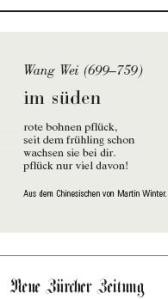





 Odpovědí na Hanušovy otázky mohou být verše Františka Basse. Tento chlapec vyjadřuje hrdost na svůj
Odpovědí na Hanušovy otázky mohou být verše Františka Basse. Tento chlapec vyjadřuje hrdost na svůj






